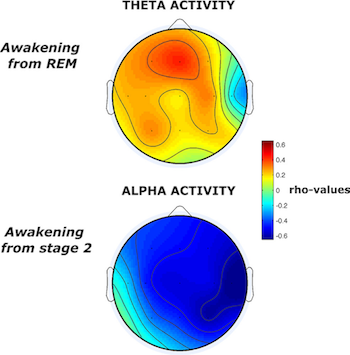Recalling and Forgetting Dreams: Theta and Alpha Oscillations during Sleep Predict Subsequent Dream Recall

This scientific study explores two hypotheses:
1. The physiological mechanisms we use to remember our dreams are the same mechanisms we use to remember things when we are awake.
2. The brain waves (sometimes called ’oscillations’) we emit during REM sleep are different than the oscillations we emit during non-REM sleep, and that these different oscillations can be predictive in dream recall when awoken from either REM or non-REM sleep.
This study did confirm and support hypothesis number 1. If theta waves (5 - 7.5 Hz) are present in higher amounts in the frontal cortex region of the brain when we are awoken from REM sleep, it is positively correlated to the ability to remember dreams. Similarly, theta waves present in higher power concentrations in the frontal regions of the brain when we commit something to memory (while we are awake) are predictive of whether we can remember it later. In the words of the scientists themselves: “our results suggest that the neuro-physiological mechanisms underlying the encoding and recall of episodic memories remain the same across different states of consciousness”, and that this “undoubtedly strengthens the notion of a continuity between waking and sleep mentation”.
Hypothesis 2 was also confirmed and supported by the evidence gathered in the study. The subjects were awoken from both REM and non-REM sleep after the scientists determined that the test subjects’ state of consciousness had remained unchanged for 5 minutes prior to awakening. While higher frontal theta activity when awoken from REM sleep is predictive of dream recall, it is lower alpha wave activity in the right temporal region of the brain that is predictive of dream recall when awoken from non-REM sleep. Interestingly, other studies (cited in this paper) have shown that people can remember words and faces better when the encoding of those memories is accompanied by lower alpha activity in the right temporal region.
The results of the study provide clear scientific evidence that not only do our brains function the same (with regard to memory encoding and retrieval) during both wakefulness and sleep, but we can predict whether a person will remember something (dreamt or not) by the presence or absence of certain rhythms in the brain.
I found this study to be of particular interest because the scientists are now exploring different states of consciousness during sleep. We know a great deal about REM sleep, since this seems to be the part of the sleep cycle when we are most active - our physical bodies seem to move without us being fully conscious of it and so it naturally captures our interest and attention. But to my knowledge, REM sleep and non-REM sleep have never before been scientifically compared and contrasted, especially with respect to brain waves which can tell us a lot about what is happening ‘under the hood’, so to speak. I applaud this endeavor and hope to see more of it in the future.
Copyright © 2026, SubtleRealm
